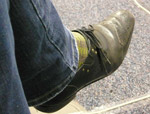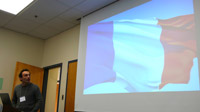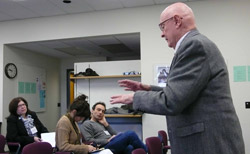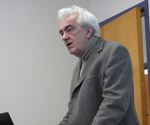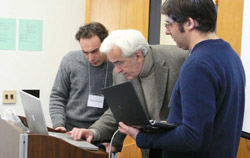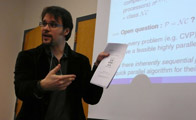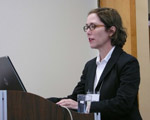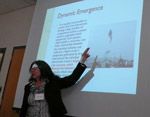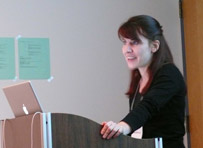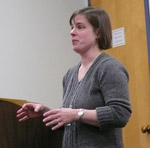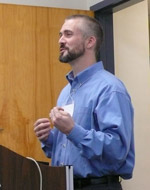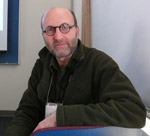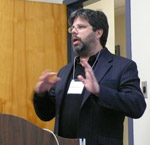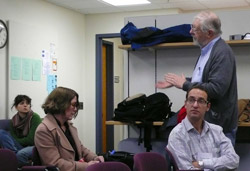::: center home >> being here >> last donut? >> pp ii |
Pitt-Paris II: Emergence and Reduction in the Physical Sciences
To set the mood, we had digitally projected images of Paris at the front of the room. They conveyed the gaiety of the city of light. However it was a hard for us to be bright. Looking out over the assemblage of faces, I had in mind the unusually cold and windy weather outside. In mock seriousness, I thanked the Pittsburgh faculty and graduate students who had sacrifices themselves to travel to Paris that summer for the first conference, leaving me here in Pittsburgh in solitude. How I wished that Paris then would have greeted them with the weather we now supplied to those who had come here today! The topic of this second conference is emergence and reduction in the sciences. We had chosen it carefully. The topic is enjoying a vigorous life in philosophy of science in at least three arenas: physics, biology and cognitive science. Yet the three discussions proceed as if in parallel universes. That separation is an awkward consequence of the increasing specialization of our profession. There are philosophers of physics, philosophers of biology and philosophers of cognitive science. Typically they read their own literatures and do not cross into the neighboring literatures. Why not assemble scholars who work on the same issues of reduction and emergence but in different sciences, we wondered, and put them in one room for a few days, where they will get to hear what everyone else is saying? Perhaps each field has nothing to learn from the others who work on the same topic; or perhaps not. This was clearly an event that would be bigger than the faculty resources just of Pittsburgh and Paris. So why not open the event more broadly, we thought. That seemed like a good plan to me. There is a real danger in closed collaborative conferences. After a few cycles of seeing the same faces recount the same thoughts, the energy can ebb. So we cast around and invited a few more speakers. Then we were bold. We opened the event with an open call. By the time our little committee was ready to read proposals, we had over fifty to look at and a most vexing problem. They were over fifty very good proposals, but we had time in the program only for a very few of them. It was now the turn of Philippe Huneman from IHPST make his introductory remarks. An attentive welcome demands the correct pronunciation. So I had rehearsed it quietly to myself: "Ehn-sti-too Dist-oire eh ..." knowing it was futile. ("Not bad!" was the crushing verdict from the grinning Frenchmen, struggled to suppress their real opinion.) As I listened to Philippe make his introductory remarks, I was starting to wonder if this coalescence of fields really was a good plan. The three fields I'd listed do all speak of emergence and reduction. But do they really share problems? In cognitive science, full-blown dualism still has serious defenders. For the dualists, the mind is ontologically more than the neurons of the brain doing what they do. It is a field in which the original debate between reduction and antireduction persists. But in biology and physics, comparable dualisms are long gone. No one seriously defends a life force as animating matter. And the idea that ordinary matter is just a collection of atoms and fields is now so familiar that is hard even to understand that not so long ago that view lay outside the mainstream of experimental science. What ensued as we passed through successive speakers and question times was an exciting juxtaposition of ideas from different field. While the committee had spent an energetic afternoon shuffling index cards over a table to form the program, it now seemed that an unseen hand had set them down to maximize suggestive connections. Our first speaker, Nicholas Rescher from Pittsburgh, was concerned with intelligence. He allowed that intelligence can only emerge when the laws are hospitable. There must be neither too much uniformity nor too much chaos in the systems that they allow. In that sense, intelligence can be understood reductively. However our explanation of intelligence cannot be reductive. We must presume it will emerge. We cannot predict it. Question time revealed how many different ideas this speech had triggered. The first question, from Jim Lennox, recalled Darwin's recognition of emergent intelligent behavior in a herd of predators. Might Nick be underestimating the explanatory power of evolutionary theory? Another question--well, from me--wondered if this analysis didn't have direct application in the recent fine tuning argument literature in cosmology. That literature claims to know that even slight adjustments to physical laws would create universes inhospitable to intelligence. Under Nick's account, they could not know that.
Jacques Dubucs' approach was rather different. His concern was the emergence of intension in systems--that they love and hate, are bold and shy. He recalled work that considered simulated robots of increasing complexity, until their behavior was only explicable to us in terms of intensions. We could no longer grasp their programs and use them to explain the robots' behavior. We had to resort to saying "that is the shy robot who avoids conflict." What followed was a slippery slope argument. If very complicated systems have intension, we cannot deny it to systems only slightly less complicated. Continuing, we end up attributing intension to the simplest of robots and even falling rocks, if think in the manner of Aristotle. At that moment, I thought that we might be seeing the brewing of a debate, for this seemed to contradict Rescher's reductionism about intelligence. But no. Dubucs' point was surprisingly close to Rescher's. From the designer's point of view, for these robots, there is no intension. That applies even to the famous chess playing computer "Deep Blue" at our neighboring institution, Carnegie Mellon University. However we observers and even the programmers themselves have no choice but to conceive of the program's operation intensionally. "Now it is trying to reinforce the Queen's side," we say. You would be excused for thinking that our event was proceeding flawlessly. That is never the case. There are always the little failures that somehow loom large. We had not ordered breakfast pastries, thinking that the pastries the university supplies are sometimes inexcusably stale and most participants would breakfast in the hotel. That was our first mistake. To paraphrase Napoleon, a conference marches on its belly. Sandy Mitchell saved us. The following morning, she and Edouard passed by a bagel and donut shop and supplied us royally. Jacques Dubucs made the second in forgetting the video adaptor for his Macintosh. That triggered a lot of huddling over different machines until finally a combination that worked emerged. Then there was the speaker who did not arrive until precisely one minute before the time of his (or her) talk. By that time we were rattled and already implementing the contingency plan of switching the order of the speakers. And that was possible only because the other speaker had only just finished his (or her) PowerPoint and was able to present. The juxtapositions continued. The notion of weak emergence came center stage. Cyrille Imbert developed a computational approach. An emergent property is one that is computationally too expensive to for us to compute. What underpinned it was a precise theory of computation specifically devoted to computers with parallel architecture. That mathematically rich approach stood in stark contrast with Jessica Wilson's metaphysical approach. Systems with weakly emergent properties, she argued, carry a proper subset of the properties of the corresponding microlevel. That did not just invite, but provoked, questions urging that the subset relations had to go the other way or even be replaced by disjointness. Wilson expected them and her replies were not so much inventions of the moment but selections from a library. After lunch, we heard Sandra Mitchell develop a view of emergence in which emergent properties could exert downward causation. The emergent properties of the flock of birds or of the beehive act causally on the individual birds and bees. On cue, the very next paper of Jonathan Davies, was devoted to urging that downward causation is a mistake, as is the very idea of the distinct levels between which it acts. The day concluded with two physics talks. Rafaela Hillerbrand sought once again to slay Nagel and his model of reduction. This time, she sought to drive her spear through his heart, his favorite example of temperature in thermodynamics and statistical mechanics. That was followed by Doreen Fraser. She was interested in Bob Batterman's controversial efforts to portray phase properties in thermodynamics as emergent. The functional discontinuities of phase transition emerge only in the limit of the number of atoms becoming infinite. She and he both wondered if this analysis could be ported over to a mathematically analogous problem in quantum field theory. It could not, she demonstrated. And to do that was quite an achievement before a non-technical audience. Renormalization group methods applied to statistical physics and quantum field theory embroil us in physics of amazing complexity. Somehow she managed to convey the content to an audience that, as we had forewarned her, was mostly bereft of theoretical physics.
The first day came to an exhausting but utterly satisfying end. In the respite of the evening, I had a chance to reflect on what I'd heard. There were many interesting novelties. I'd never thought so seriously about how computational and complexity limits might be brought to bear on emergence. My French colleagues were showing the way. Where I hoped for progress was in deciding whether their analysis was merely the displaying of analogy between profound and precise results in computation theory and the vaguer ruminations on emergence in natural sciences; or was it a direct theory of emergence in the natural science. What continued to nag at me, though, was a long harbored worry that refused to quiet. Long ago, it seemed to me, there was a clear issue to be resolved surrounding reductionism. In biology we had to decide whether life processes were just chemical. Or is living matter animated by a life force, as the vitalists believed. In physics we needed to decide if matter is just atoms, molecules and the fields that mediate between them. Both debates were settled long ago in favor of the reductionist view. There is no life spirit; there is nothing more than atoms and molecules. All this is an ontological issue that has long been decided. That is where things should have rested. But like the arch-villain of a sci-fi-horror movie, the beast refuses to die. It comes back, not in the ontological realm but in the explanatory realm. We now worry whether reductive explanations succeed. In that realm there simply is no clear meaning for terms like reduction and emergence. If this is not obvious to you, ask anyone for a clear account of what explanation is and just what is licit in an explanation. The resulting latitude has enabled the whole discussion to collapse into a fruitless concocting of tortured definitions of reduction and emergence, all carefully contrived to fit the proposer's predilections. There are real and interesting issues to discuss. How does our sciences deal with the hidden and visible, the small and the large, the quick and the dead? Let's stop forcing this important analysis into the mold of terms that mean something different for each of us and mattered only in debates long since decided. As Ken Waters had pointed out to me long ago, the need to divide up science into explanatory autonomous levels or controlling levels is an obsession of philosophers not shared by scientists. They move freely and opportunistically between molecules and organisms.
That stopped me. It was just too far-fetched that this tiny analysis of competing accounts of protein folding could licitly throw any light on the venerable decision between reductionism and antireductionism. So, in question time, I probed. "Isn't it time to retire the terms emergence and reduction?" I asked. "Here's a philosopher of biology providing an example that is entirely chemical. Doesn't that show that debate is over. Reductionism won!" Then something happened I did not expect. I confirmed afterwards with others that I had not imagined it. An audible, communal gasp filled the room. I heard calls of "no!" I could see heads shaking. All I meant was that vitalism had lost. However the term reductionism has become so demonized that each of those heads no doubt thought that I had said something different; and whatever it was I'd said, it had to be foolish and indefensible. That reaction sealed it. We really do need to retire the terms reduction and emergence, at least in physics and biology. It was a sad moment for me. It confirmed that we are in the grip of a dogma. I've seen it often enough in casual conversation with some philosophers of biology and physics. Any suggestion that reductionism might be correct triggers head-shaking astonishment. It has to be emergence, even if these shaking heads cannot agree on what the term means. It is fine for someone to proclaim a phenomenon emergent and supply a contrived definition to vindicate the claim. But to do the same with reductionism, as I had just done, is not. There were many more talks and much illumination shared. There were more doubts expressed about the utility the notions of reduction and emergence and the picture of levels they presume. Most revealing was Michael Silberstein's talk. He recounted the funding battles between particle and condensed matter physicists. Their hyperbolic claims of reduction or emergence just happened to align with the funding goals of each group; and there is an occasional concession that funding is really their driving concern. When a debate in physics has decayed to this extent, we philosophers need to be especially vigilant that we do not get drawn into taking arms for one side or another, especially when the views of each side are driven as much by funding needs as independent and cogent reasons. Ken Schaffner closed the conference by provocatively announcing reduction "undead"--graphically introducing the same metaphor I used above. There were further disasters. An ice-storm on Sunday morning shut down the bus system. It temporarily stranded locals, including the three local organizers, Sandy, Edouard and me. In addition to the Napoleonic moral, we learned another important principle of conference organization: don't schedule an event in conflict with unexpected bad weather! There is so much more to report. Dear reader--the few of you who are still reading--will you forgive me if I sign off here? I need to stop thinking about reduction and emergence and to start thinking about the interesting problems. I don't care if someone can contrive a definition that makes phase transitions emergent. What I do care about is the astonishing fact that we need to imagine a system with infinitely many atoms if we are to explain a phenomenon we see happening among finitely many. What does that tell us about our modes of explanation?!
John D. Norton |


